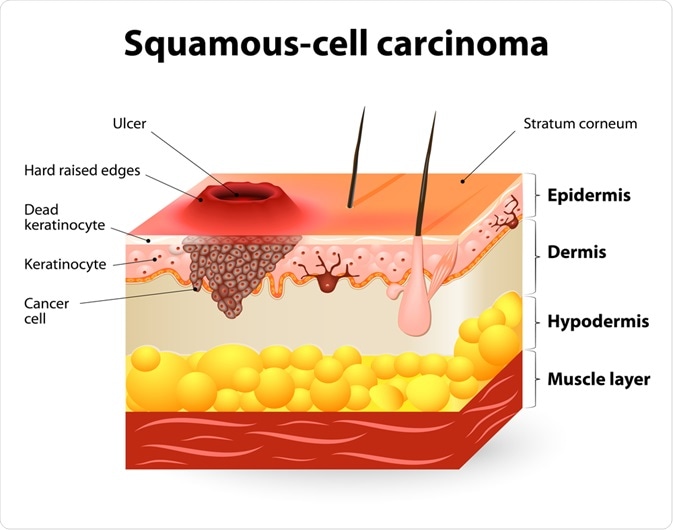Squamous cell carcinoma (SCC) is a health condition involving the uncontrolled growth of the outer squamous cells of the epidermis, which is the outermost layer of the skin. SCC occurs as a result of keratinization of the epidermal cells and has the potential to metastasize to other regions of the body.

Image Credit: Designua / Shutterstock.com
Symptoms
The presentation of SCC can occur on any area of the body but is most common in areas that are frequently exposed to ultraviolet (UV) radiation, such as the ears, lips, face, neck, head, arms, and legs. Distinctive signs on the skin can help to diagnose the condition, including:
- Red, scaly patches
- Open sores
- Elevated growths with depressed center
- Crusting or bleeding of the area
SCC can be classified as either “in situ,” which indicates that the cancer is confined to the localized site, or “invasive,” which involves the surrounding tissues and has the potential to spread to other organs in the body. Non-invasive carcinoma may also be referred to as Bowen’s disease.
Epidemiology
Skin cancers have a higher incidence than any other type of cancer that continues to rise, despite the knowledge and public health campaigns about their prevention. To this end, SCC is the second most common type of skin cancer after basal cell carcinoma (BCC).
In the United States, of the approximately 3.5 million new cases of non-melanoma skin cancers that are diagnosed each year, approximately 700,000 of these cases of SCC, with its incidence increasing each year.
Men are more likely to be affected by SCC than females, which is thought to be linked to greater exposure to UV radiation, particularly to the head and neck area.
What is Squamous Cell Cancer? - Squamous Cell Cancer Explained [2019] [Dermatology]
Causes and risk factors
Exposure to UV radiation appears to carry the greatest risk of SCC and is seen as the primary cause of the condition. Additionally, individuals with fair skin are more susceptible to the damage caused by UV radiation.
For this reason, people with fair skin living in areas with high sun exposure, such as the predominantly Caucasian population of Australia, are most likely to get SCC. Regions in the equatorial zones tend to have particularly high levels of UV radiation.
Additionally, there are some other risk factors that may lead to the condition. These include:
- Chemical carcinogens (e.g., arsenic, chromium, soot, and tar)
- Infection with human papillomavirus (HPV)
- Exposure to ionizing radiation
- Immunodeficiency
- Chronic inflammation surrounding ulcers or sinuses
- Xeroderma pigmentosum
- Albinism
Prevention
As SCC is a relatively common condition with potentially serious outcomes, there have been a considerable public health and educational campaigns in recent decades to reduce the incidence of the disease.
It is important that populations at risk, particularly those with fair skin living in areas with high UV radiation exposure, are aware of ways in which they can reduce their risk of the condition.
This includes avoiding excessive sun exposure in the problematic times of the day, usually between 11 am and 3 pm, by staying indoors or in the shade. Wearing appropriate clothing and sunscreen to protect skin while in direct sunlight is also recommended to help prevent the development of SCC.
Signs of early development of Bowen’s disease should be widely known to allow for its early diagnosis, intervention, and management.
Related conditions
There are several other conditions that may present with similar symptoms to SCC and thus require a differential diagnosis. These include:
- Keratoacanthoma, which is a mild malignancy of the skin with a central keratin plug, originating from the pilosebaceous glands.
- Marjolin’s ulcer is a distinct type of SCC that arises from an ulcer or burn wound that failed to heal normally.
- BCC
- Erythroplasia
- Malignant melanoma
- Solar (actinic) keratosis
- Pyogenic granuloma
- Seborrhoeic or plantar warts
References
Further Reading
Last Updated: Apr 27, 2021